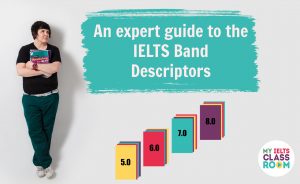
IELTS essay skills – Writing about IELTS Social Trends
IELTS essay skills – Writing about IELTS Social Trends
In the world of IELTS we often discuss “types” of essay (Discuss Both Sides, Advantages and Disadvantages, etc) and common topics (environment, work, education, etc), but we rarely talk about common “themes”. Today I want to talk about one theme that often appears but is rarely discussed: essays that focus on social change. These are essay questions which present a current social trend (the increase in crime, the loss of community, etc) and then ask you to examine it in some way. Today, Nick and I explain how to recognise IELTS social trend questions and how you should approach them to make sure that your writing is 100% on-topic.
Below, you can find a summary of the episode, which includes all of the links to useful materials and the times of each part of the discussion (so you can go directly to the part you want to listen to) 🚀
Subscribe to My IELTS Classroom podcast on Apple podcasts here
Subscribe to My IELTS Classroom on Google podcasts here
What do “IELTS social trend” questions look like?
Most of the time, social trend questions ask you to consider the “cause” and “solution” for a particular social change. You may, for example, be told that “people today spend less time with their neighbours” (this is the social trend) and then asked “why this is” (cause), and “what can be done to address the situation” (solution).
However, this is not always the case. While it is true that 99% of the time you will be asked to identify the causes of the trend, the second question can vary. You may be asked:
- what problems the trend can lead to
- if the trend is a positive or negative development
- if the advantages of the trend outweigh the disadvantages
- or you may be given a unique direct question (such as in the question in Cambridge 16 about “how to research the history of a home”
Whatever the combination of questions, the key thing to remember when answering these tasks is to focus on the CHANGE. If you do this, not only will you find it easier to generate ideas, but you will also have a better chance of addressing the question fully.
How can I identify questions that focus on “social trends”?
IELTS is generous and almost always leaves a lot of clues in the task when they want you to examine a social trend. Look at the following three social trend questions – what words has IELTS used in the task to indicate that you should focus on the change?



If you answered with the phrases “more and more”, and “than ever before”, or with the tense “the present continuous”, or the verb “become” – well done! These are the clues that these are social trend questions.
Our GOLD IELTS writing packages contains everything you need to achieve a high score from video lessons and practice activities, to marking and live one-to-one lessons with a native IELTS expert. Find out more here.

Why is it important to identify social trend questions?
As we discussed earlier, almost every social trend question asks you to identify the reasons for a change in behaviour. To do this well, you will need to consider what life was like in the PAST, what it is like NOW, and what has happened to prompt that CHANGE.
In other words, you will need to make comparisons between the past and now to address the question fully. Let’s go back to this question to look at an example:

A weak student will focus only on “why people like to travel abroad”. They will write sentences about people who want to experience a new culture, or take advantage of a better climate, or see beautiful sites. However, while all of these things are true, they have been true for decades! I am sure that my grandparents would have loved to have seen the Coliseum in Rome, or eaten sushi in Japan, or sunbathed in Jamaica.

What the student has failed to consider is the social trend. We have not been asked to discuss “why people like to travel”. We have been asked to discuss “why more people are travelling today than ever before”! In other words, we should focus on what has caused people’s behaviour to change, and to do this, we should ask ourselves the simple question:
Why are more people travelling today than in the past?
Once you ask yourself this question, you should (hopefully) come up with ideas like:
- it is much cheaper to travel now than it was even a decade ago (low cost airlines have made travel accessible for all)
- there are fewer visa restrictions and red tape (in the past, it was difficult for citizens of some countries to even get a passport e.g. The Soviet Union)
- the travel industry has developed so it is now easier to visit countries that were once inaccessible (people speak English, there are tour guides, etc)
Can you see the difference? Now we are focussing on the reasons why MORE people travel today THAN IN THE PAST our ideas are totally transformed!
In the episode we will look at 5 more questions to practice this together. The key though is to always think about what life was like in the past, then think about what it is like now, and THEN think what happened to prompt the change in behaviour.
Want to know how the examiner will apply the band descriptors when marking your IELTS essay?
Then download a copy of our FREE e-book, which explains how each of the four marking criteria is applied and includes the most common errors made by test-takers. Just click here for your copy.

Do IELTS social trend questions always ask us to compare to the past?
No, not always. There are also questions that ask you to consider the future. These are slightly different as they ask you to make a PREDICTION about a social trend. Take this question for example:

Almost every student that has written this question for me has disagreed with this question and given arguments similar to the incorrect ones above about why more people travel – people like to try new culture and sunbathe abroad. In other words, they write “blah blah blah answers” about travel in general instead of focussing on the main point of the question:
what the future of tourism looks like.
Have a think about that now. What do you think tourism will look like 30, 40 or even 50 years from now? To do this, you may want to consider what changes have already taken place in the travel industry, as these may give you a clue about the future. We have definitely seen an increase in tavel abroad in recent decades. Think about it. 30 years ago, a holiday abroad was something special. Almost nobody could afford to travel overseas and, if they did, it was just once a year and seen as a luxury. Today, people think nothing about travelling abroad. The cost of air travel is cheap and there is far more tourist infrastructure now than ever before.

But what about the future? What could affect how much we travel abroad? If you think really about what is happening in the world today, you may soon find that you AGREE with the question i.e. that in the future people will travel abroad less:
- with global warning increasing, it is likely that there will be higher taxes on fuel, so airline travel will, once again, become more expensive
- we have just witnessed one global pandemic, which shut down the planet. We can expect to experience more of these in the future, which may limit travel to inside your own country (or people may be too afraid to travel)
Again, can you see the difference? We are focussing on the FUTURE TREND of tourism and PREDCITING what could affect the movement of people. Doing this gives us vastly different ideas and arguments than if we just ask “what do people prefer – staying at home or going abroad”?
There is obviously no correct answer to this question as nobody knows what will happen in the future (who could have predicted COVID, for example!), but whether you agree or disagree, the key is that your arguments have to focus on possible CHANGES in the future, rather than a simple description of what people like now!
